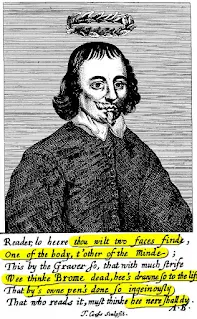RICHARD B R O M E -- JOHN F O R D
any coherence between these names ?
Richard Brome John Ford
In Shakespeare's -> „The Merry Wives of Windsor“ (Q1/Q2) Master Ford, jealous of Sir John -> Fallstaff, calls himself "Brooke" when disguised. In the First Folio (1623) the name Brook astonishingly was changed to „Broom“.
In the epistle to his „Five New Playes 1653“ by ->Richard Brom (sometimes Broome) a certain A.Brome (his brother?) writes: „… tis not Money, for then I should loose my labour; Tis not praise, for the Author bid me tell you, that, now he [Brome] is dead, he is of Falstaffs minde, and cares not for Honour.
In the epistle to his „Five New Playes 1653“ by ->Richard Brom (sometimes Broome) a certain A.Brome (his brother?) writes: „… tis not Money, for then I should loose my labour; Tis not praise, for the Author bid me tell you, that, now he [Brome] is dead, he is of Falstaffs minde, and cares not for Honour.
 The Author ->John Ford (1606) dedicates his „Honor Triumphant“ to the „Honor of all Fair ladies, saying in the dedication:" I will be an alien to mine owne issue: as unworthy to be christined for mine, since dis-esteeming in beeing mine" and tells about himself in "Christ[opher]es Bloodie Sweat or the Sonne of God in his Agonie"
The Author ->John Ford (1606) dedicates his „Honor Triumphant“ to the „Honor of all Fair ladies, saying in the dedication:" I will be an alien to mine owne issue: as unworthy to be christined for mine, since dis-esteeming in beeing mine" and tells about himself in "Christ[opher]es Bloodie Sweat or the Sonne of God in his Agonie" (I liv'd the subject of both scorne and shame, banish't from mirth, of comfort all deprived, horrors of scandall...and
as I lived, I died alive....disgrace upon my name, imprison'd and opprest ...uncertaine where to lead me to my bed...
as I lived, I died alive....disgrace upon my name, imprison'd and opprest ...uncertaine where to lead me to my bed...
Is this alle mere coincidence?
Or shouldn‘ t one look for any coherence between the texts and name of a disguised „Broom“, between „Falstaff“ , „Shakespeare“ and „ Ford“? (s.also ->.Blog 55)
It immediately would make sense, when accepting , that these names were "Pen-names" or "Pseudo-names" and the texts always representing biographic aspects of the same.
what do you should know about Ford
V I D E O JOHN F O R D
VIDEOS – Complete Video Archive:
OPEN —> Heading--> Home -->Videos -- Shorts -- Posts
->Popular



